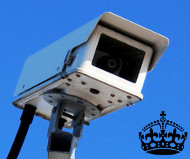Article from: www.thenewspaper.com/news/41/4191.asp
8/28/2013
UK Government Surveillance Camera Rules Take Effect
UK Home Office publishes rules for automated license plate readers and surveillance cameras.
 After having used Automatic Number Plate Recognition (ANPR, also known as ALPR in the US) cameras to track motorists for more than a decade, the UK Home Office decided earlier this month to issue a code of practice to govern its use. The mostly voluntary guidance is designed to give the public more power to challenge improper police use of the technology. Enforcing the new rules falls upon Andrew Rennison, who was appointed as surveillance camera commissioner last year, though few of the provisions are legally binding.
After having used Automatic Number Plate Recognition (ANPR, also known as ALPR in the US) cameras to track motorists for more than a decade, the UK Home Office decided earlier this month to issue a code of practice to govern its use. The mostly voluntary guidance is designed to give the public more power to challenge improper police use of the technology. Enforcing the new rules falls upon Andrew Rennison, who was appointed as surveillance camera commissioner last year, though few of the provisions are legally binding.
"In addition to making clear the legal obligations in relation to the necessity and proportionality of surveillance camera systems, the code promotes greater transparency on the part of system operators and a climate of surveillance by consent," Home Office officials explained. "It also promotes the more effective use of surveillance cameras where they are necessary."
Britain is already one of the most surveilled nation's on the planet, with a vast array of closed circuit TV (CCTV) cameras, speed cameras and license plate readers. The code sets out twelve principles designed to make the government spying operations more transparent.
"Motorists may regard enforcement by cameras as over-zealous and relevant authorities should use them sparingly," Section 1.12 of the code explains. "Such systems should, therefore, only be deployed where other means of enforcement are not practical and their effectiveness in achieving this purpose is subject to regular review."
The principles state that surveillance cameras should only be used to meet a pressing need, and the deployment should be proportionate to the stated purpose. Motorists must have a published contact point for access to information about the camera system and to make complaints. There must be someone clearly accountable for camera use and misuse. Operations must follow stated procedures, with compliance measured by regular audits and published reports. No more images should be stored than are required for the stated purpose, and the data must be secured from unauthorized use.
License plate scanning cameras collect a vast array of personal data. On Monday, the Fort Collins Coloradoan newspaper reported the camera records could be used to track the movements of one of their reporters over a two-year period. It did so by obtaining the 40 gigabyte database of license plate reads which is made available to anyone who asks for it. In Minnesota, the Star Tribune newspaper accessed the Minneapolis mayor's location records through a similar public information request. The mayor's car was spotted on more than forty occasions in various locations throughout the city.
A copy of the UK code is available in a 400k PDF file at the source link below.
Source: Surveillance Camera Code of Practice (UK Home Office, 8/12/2013)
Permanent Link for this item
Return to Front Page
 After having used Automatic Number Plate Recognition (ANPR, also known as ALPR in the US) cameras to track motorists for more than a decade, the UK Home Office decided earlier this month to issue a code of practice to govern its use. The mostly voluntary guidance is designed to give the public more power to challenge improper police use of the technology. Enforcing the new rules falls upon Andrew Rennison, who was appointed as surveillance camera commissioner last year, though few of the provisions are legally binding.
After having used Automatic Number Plate Recognition (ANPR, also known as ALPR in the US) cameras to track motorists for more than a decade, the UK Home Office decided earlier this month to issue a code of practice to govern its use. The mostly voluntary guidance is designed to give the public more power to challenge improper police use of the technology. Enforcing the new rules falls upon Andrew Rennison, who was appointed as surveillance camera commissioner last year, though few of the provisions are legally binding.